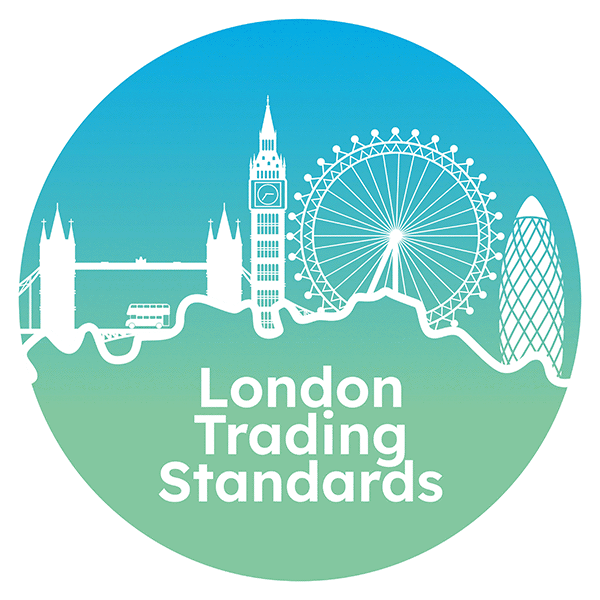- London Trading Standards (LTS) represents the 33 Local Authority Trading Standards services in the London Region. We share information and awareness campaigns across the capital to protect consumers and safeguard legitimate enterprise. www.londontradingstandards.org.uk
- Our members advise on and enforce laws that govern the way we buy, sell, rent and hire goods and services. We carry out inspections and monitor or investigate complaints. We endeavour to work with businesses to help achieve compliance but ultimately we can prosecute those who break the law.
- For information about government approved redress schemes: https://www.gov.uk/government/publications/lettings-agents-and-property-managers-redress-schemes
- The National Approved Letting Scheme (NALS) has created a toolkit to help local authorities tackle rogue letting agents who fail to comply with the law. http://www.nalscheme.co.uk/wp-content/uploads/2017/05/NALS-Effective-Enforcement-in-the-PRS-Toolkit-June-2016.pdf The toolkit is in the process of being updated and a revised version will be launched this summer.
- LTS recently supported NALS’ SAFEagent week and on Effective Enforcement Day, provided a webinar to explain best practice to letting agents.
- https://www.londontradingstandards.org.uk/news/london-trading-standards-helping-to-keep-landlords-and-tenants-safe/
- Free webinar: https://www.safeagents.co.uk/london-trading-standards-and-safeagent-free-webinar/
- The government has announced that tenant fees will be scrapped and Client Money Protection will be compulsory in England from April 2019 https://www.gov.uk/government/news/government-action-to-end-letting-fees
- The Consumer Rights Act 2015 – requires letting agents to clearly publicise their fees and charges and other information. Letting agents must display a list of their “relevant fees” and other required information in their premises in which they deal with customers face to face, and also on their websites. The lists in their premises must be clearly visible to prospective tenants and landlords.
- “Relevant fees” are fees, charges or penalties payable to the letting agent by tenants or landlords. The list of fees must include:
- a description of each fee, so that customers understand what it is for (e.g. “administration charge” is too vague a term, agents must specify what it covers);
- for tenants, an indication as to whether the fee is per tenant or per dwelling unit; and
- the actual amount of each fee, including tax; or, if the fee cannot be worked out in advance, a description of how the fee will be calculated.
In addition, all letting and/or property management agents must publish with their list of fees:
- a statement as to whether the agent is a member of a client money-protection scheme; and
- an indication that the agent is a member of an approved redress scheme, and to which scheme they belong.
This legislation came in to force on the 27th May 2015 and breaches of the Act carry a penalty of up to £5,000 per breach and government guidance recommends that the full penalty should apply unless there are exceptional circumstances.
For Further information about the Act:
- https://www.businesscompanion.info/en/quick-guides/services/letting-agents-display-of-fees
- http://www.legislation.gov.uk/uksi/2015/951/pdfs/uksiem_20150951_en.pdf
- http://www.legislation.gov.uk/ukpga/2015/15/contents/enacted
- Examples of other legal action taken by Trading Standards against letting agents:
An Islington based lettings agency run by a jet-setting couple faced fines and costs of more than £20,000 after the company admitted that it illegally deprived tenants of their housing rights by wrongly issuing “sham licences” designed for live-in nannies or lodgers instead of assured tenancy agreements to two renters in Holloway. This meant they had no legal protection against eviction by their landlords or any guarantee that their deposit would be returned. The local authority brought a prosecution against the firm that is thought to be the first of its kind in Britain.
Fly-boarding also still remains a major problem in the Capital. This is the practice of having a sign outside a property giving the misleading impression that there is a property y to sell or rent when this is not the case. Rogue agents do it to create new business by enticing new customers to make contact. The borough of Enfield alone has served 221 removal notices and 185 fixed penalty notices in the last 18 months in respect of this practice.
In another letting related matter a confiscation hearing will take place next month at Southwark Crown Court to determine if a convicted ‘letting agent’ should pay financially for his crimes by having any illegally obtained benefit confiscated. This follows a successful prosecution under the Fraud Act 2006 by Westminster Trading Standards resulting in the individual purporting to be a letting agent been imprisoned for 28 months for taking prospective tenants deposits and rent payments without providing the property.
In July 2017 – A letting agent pleaded guilty over false claims following an investigation by Southwark Trading Standards. A property management and lettings business based in East London, and its Director pleaded guilty to unfair trading offences relating to false claims about membership of the National Approved Lettings Scheme (NALS) and the Safeagent scheme. Sentencing is due to take place at the end of confiscation proceedings relating to other offences.
- London Trading Standards have spokespersons available to deal with media requests.
Contact Details
- London Trading Standards – media@londontradingstandards.org.uk
